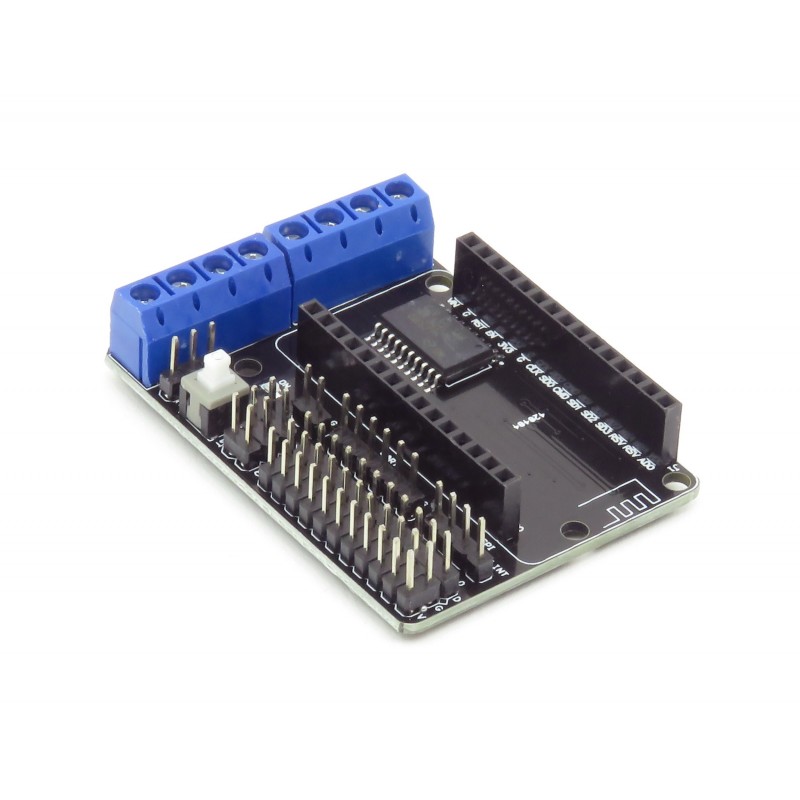



zł5.75 tax excl.
The base board for the Wi-Fi NodeMCU module (ESP-12E), thanks to the built-in L293DD system, allows for attaching e.g. motors, electromagnets or other executive devices. The I/O lines of the NodeMCU module were derived to the pin connectors, and the power supply can be connected with the use of screw connectors. ESP12E Motor Shield
The base board for the Wi-Fi NodeMCU module (ESP-12E), thanks to the built-in L293DD system, allows for attaching eg motors, solenoids or other executive devices. The I/O lines of the NodeMCU module were derived to the pin connectors, and the power supply can be connected with the use of screw connectors.
Manufacturer BTC Korporacja sp. z o. o. Lwowska 5 05-120 Legionowo Poland sprzedaz@kamami.pl 22 767 36 20
Responsible person BTC Korporacja sp. z o. o. Lwowska 5 05-120 Legionowo Poland sprzedaz@kamami.pl 22 767 36 20
WiFi module based on ESP8266. The module has a built-in antenna and USB-UART converter. The module can be programmed in Lua (under the control of the NodeMCU firmware) or in the Arduino environment. 10 GPIO lines are available which each can be configured to work as PWM, I2C.
This ESP8266-based development board is designed for rapid IoT application development. It features support for two Grove Plug-n-Play connectors, digital and analog I/O, and UART and I2C interfaces for connecting multiple sensors and modules. The device supports OTA firmware updates, a RESTful API, and integration with mobile apps and IFTTT, allowing for easy remote control and monitoring. Seeed Studio 102110057
WiFi module with ESP8266 and 1.14" display, designed to work with Raspberry Pi Pico. It communicates via UART interface using AT commands. SB Components 21888
Development board D1 Mini V3 with WiFi module ESP-8266 and 4 MB Flash memory. The module can be programmed from the Arduino IDE level. WeMos D1 Mini V3.x
Development board ESP8266 with WiFi module; WRL-13231
WiFi module based on ESP8266. It has an embedded antenna and 0.96 "OLED display. The module can be programmed in Lua (under NodeMCU firmware control) or in the Arduino IDE. Provides 12 GPIO lines.
Evaluation set designed for the use of Internet of Things based on ArduCAM-Mini-2MP and ArduCAM-ESP8266-Nano-V2 modules. ArduCAM-Mini-2MP is a module with a 2 megapixel camera with an OV2640 transducer and an ESP8266 chip. Mounting the M12 lens. ArduCAM B0085
The module is based on the ESP8266EX chip. Thanks to the support of the 802.11 b/g/n standard, it enables wireless communication with WiFi networks, which allows for Internet access and data exchange. It is programmed via the USB Type-C connector using Arduino, MicroPython or NodeMCU. WeMos D1 Mini Type-C
Development board with dimensions and spacing compatible with Arduino Uno R3. It have built-in Wi-Fi ESP8266 module. The device is compatible with WeDOS D1, it can be programmed from the level of Arduino IDE
WiFi 802.11 b/g/n module with ESP8266 system, 16 terminals are available with a 2 mm pitch with the possibility of soldering gold pins, there are 9 GPIO lines and 1 ADC line on the connector. Built-in ceramic antenna and U.FL antenna connector. ESP-07
WiFI 802.11 b/g/n module. Equipment includes, among others: LED diode, antenna, 8 pins with 2.54mm pitch (including 3 GPIO lines). Power supply: 3.3V.
WiFi module with ESP8266 designed to work with the Raspberry Pi Pico. It communicates via the UART interface using AT commands. Waveshare Pico-ESP8266
Wi-Fi module based on the ESP8266 system - simplicity of use (communication through UART, supports AT commands), 3.3V power supply, support for WPA / WPA2 encryption - these features make the EPS8266 module applicable anywhere, where reliable and effective data transmission. The module is not equipped with an antenna, it should be attached using the U.FL connector. ESP-05
The module is based on the ESP8266MOD chip. Thanks to the support of the 802.11 b/g/n standard, it enables wireless communication with WiFi networks, which allows for Internet access and data exchange. WeMos D1 Mini Type-C
Development board with the ESP-WROOM-02 WiFi module. The board has a USB-UART converter, a basket for a Li-Ion 18650 battery and a charging circuit
WiFi wireless communication module compatible with the pin spacing of XBEE modules. The module is powered by 3.3 V. The product is compatible with Arduino. DFRobot TEL0092
WiFi 802.11 b/g/n module with ESP8266 chip, there are 8 pins with UART and GPIO interface. Built-in PCB antenna. SparkFun WRL-17146

The base board for the Wi-Fi NodeMCU module (ESP-12E), thanks to the built-in L293DD system, allows for attaching e.g. motors, electromagnets or other executive devices. The I/O lines of the NodeMCU module were derived to the pin connectors, and the power supply can be connected with the use of screw connectors. ESP12E Motor Shield
